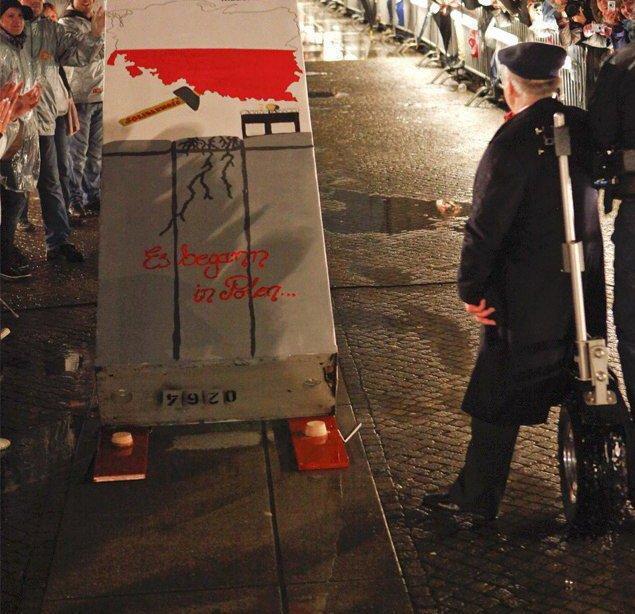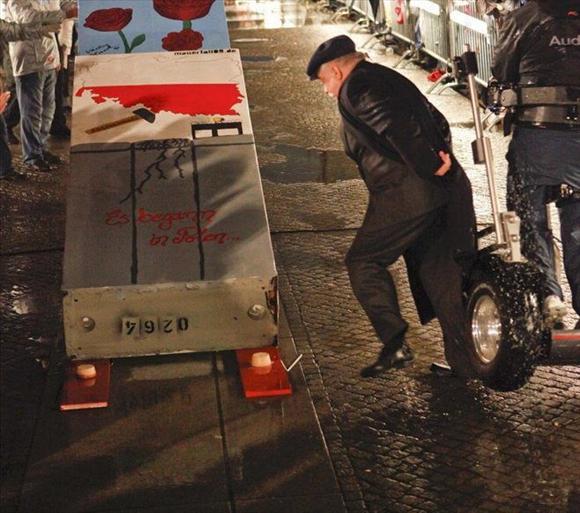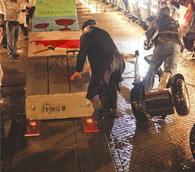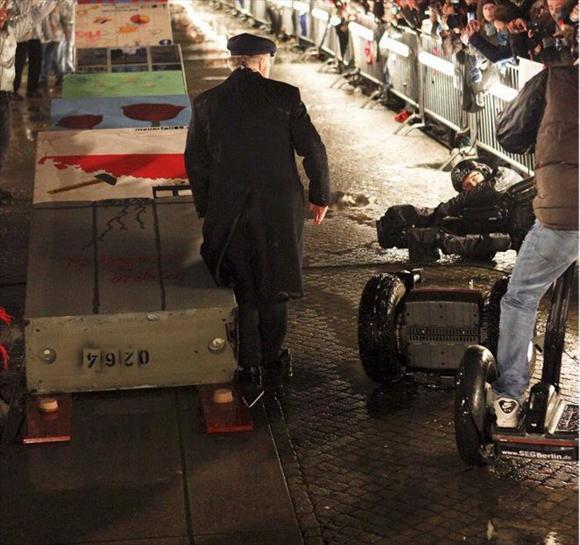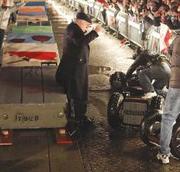Lech Walesa, former head of the Polish Solidarity movement, the man who started the domino collapse of the Evil Empire, is considering legal action against the organizers of the 20th anniversary of the fall of the Berlin Wall.
On Nov 9th, moments after Lech Walesa pushed the block of dominoes symbolizing the fall of Berlin Wall, Walesa, 66, collided with a segway operated by the organizers' filming crew. Walesa, hit in the back by the speed-gaining, 120-pound souped up two-wheeler, grabbed his back, staggered, leaned against the domino blocks, but held on.
A week later Lech Walesa was hospitalized in a clinic for Polish government VIPs in Warsaw. He complained about a back pain. Two weeks later, the pain did not recede. " I can't get up from my chair," Walesa complained to the Polish newspaper Super Express. "If my condition doesn't improve I will take the organizers to court," he said.
This week Walesa unexpectedly cancelled his appearance in London, where he was to receive an honorary doctorate in philosophy at the London Metropolitan University.
"Walesa cancelled on the advice of his doctors", said Liz Walker, chairman of the Association of Polish Entrepreneurs & Companies. "Since the unfortunate accident in Berlin, Walesa complains of back pain," she added.
Recalling the accident, Walesa maintains he didn't feel the pain in his back until 11 o'clock the next day, when during the coffee break for the Nobel Peace Prize recipients, he "couldn't get up from a chair." However, the organizer of the Festival, Kultur Projekte Berlin, tells a different story.
During his stay in Berlin, Lech Walesa was constantly accompanied by an organizer's representative, said Simone Leimbach of Kultur Projekte Berlin in a written statement to my inquiry. "Lech Walesa did not complain about any kind of discomfort and did not ask for medical help", Leimbach added. The company did not offer apology to Walesa for the incident.
Some personal injury attorneys interviewed for this publication argue that Walesa might have a legal case. "Two things happened", says one of the attorneys on a condition of anonymity. "One, he was hit in the back which is documented on camera; two, he complains about back pain as a result of the accident."
Ultimately it is up to the doctors to decide if the injuries occurred. Sources say, however, that doctors examining Walesa in a Polish clinic a week after the accident occurred, did not detect any permanent injury to Walesa's back.
Attorneys still argue that in the absence of his prior history of back pain it is still possible to compensate an accident victim for medical expenses, pain and suffering.
"We see a lot of times when people are hurt, especially in back injuries, that if you can prove that event occurred and if we know that the client had a back problem shortly after it, in the absence of his prior history of back pain, you have a case", says an attorney specializing in personal injury litigation.
Lech Walesa didn't reply to questions about the case by the time of this publication. Asked about the incident in an interview with a Polish news channel TVN24, Lech Walesa commented bitterly: "You gotta die of something."
The story of a block of coal.
The first time I saw Lech Walesa was in 1981. Times were tough. The Solidarity trade union, born in the agreement between the communist government with the striking workers of Gdansk Shipyard, was just a few months old. The Poles were tired, hungry and furious. The blood of the Pulaski nation was slowly reaching the boiling point.
People were afraid that the Communist government, pressed by the Solidarity union against the wall, will perform some sort of a provocative "hocus pocus" and use it as an excuse to bring to Poland the Soviet tanks that "quite accidently" held military maneuvers Soyuz 81, just across the border.
And then -- it happened. Jan Rulewski, a local Solidarity activist occupying governmental offices in protest, was removed from the building head first. The photograph of the beaten union worker circulated throughout the town. People took to the streets.
In solidarity with the workers, my (at the time) classmate, Radek Sikorski, current Foreign Minister of Poland, hit the streets with "bibula"-- hand-made illegal pro-Solidarity leaflets, which we wrote earlier. They were stamped with the seal of our School Striking Committee, whose matrix we carved out of a sliced potato (private printing machines were illegal and Communists required typewriters to be registered).
I went on to steal coal from our school boiler room in order to bring it to an elderly woman who couldn't afford heat in her apartment. Radek and I both knew well that if caught, we could kiss our Polish lives goodbye.
The block of coal was big, heavy and barely fit into my rag bag. I carried it down the street when the word broke: Lechu (that's how we called Walesa back then: La-khu) is in town! There he was: standing on the balcony of a building in our town's market square.
Walesa talked about freedom. As great an orator as he is, Walesa spoke our language; simple, strong, passionate. He spoke about rights we didn't have, life we could not afford. He spoke about the right to liberty and property and the right to live a dignified life without an undignifying regime.
Lechu was talking and talking and the crowd was growing and growing. I stood amongst it, a teenager, in the center of the square, literally frozen, listening to Walesa and back then in that square in Poland, on that cold, March afternoon, for the first time in my young life I began to believe that freedom to Poland would come.
When Lechu finished his speech, the crowd -- by now about a thousand strong -- moved on somewhere ahead by itself, chanting: Lech Wa-lesa! Lech Wa-lesa! Then suddenly, it stopped. The monolith of black shields of ZOMO (paramilitary special forces of the police) was forming quickly ahead. The police clubs began to work.
There was nothing to fight them with. The workers bare hands against strong, well fed communist's protectors trained in beatings. I looked at the block of coal I held in my bag and thought of the freezing woman waiting for it and that in Poland coal is called "the black gold."
I took the black slab out from the bag, raised it above my head and slammed it against the street. Eager hands of workers picked up the pieces... The black hail of coal rained upon ZOMO. It joined cobblestones which someone else had torn out from the pot ridden street. Another day of the fight for freedom was on.
I recalled all that, 28 years later, sitting in an armchair in my house in New Jersey, sipping a martini which was embracing me like my first woman: slowly and unhurriedly. I watched Lech Walesa on TV, live, standing on a street of Berlin. Looking older, with his famous mustache now gray, he stood in front of the styrofoam wall of dominoes symbolizing the Berlin Wall, ready for the symbolic push. I very much wanted Walesa to do it right.
The only thing that was pissing me off in this historic view was a segue-equipped television crew hanging on next to him, constantly getting in the shot of the international television feed. Being 20 years in the television production business I knew they had the "hard pass" which other not-so-lucky film crews despise. It meant they will be close to the event and I knew if they didn't know what they were doing we would have a problem. And we did.
Lech Walesa -- the man who "collapsed communism," survived prison threats, isolation camps, plots and political intrigues, 28 years after he made people pick up the black gold of the nation and throw it in the face of the evil -- staggered.
If he would have fallen, well, that would have been the news. But I knew Lech Walesa would not fall. Not "our" Lechu. He staggered, leaned forward, but held on. It was just one of these things that was meant to be.
But will the lawsuit take him down? Will the charisma and the historic image of the great leader he enjoys, succumb to pettiness of our times that are a'changing? Times in which we fight not with rocks, stones and fists but with lawyers and tricks, and where pain and suffering always has a monetary value attached? No, Lechu will not sue. Lech Walesa is bigger than that.
